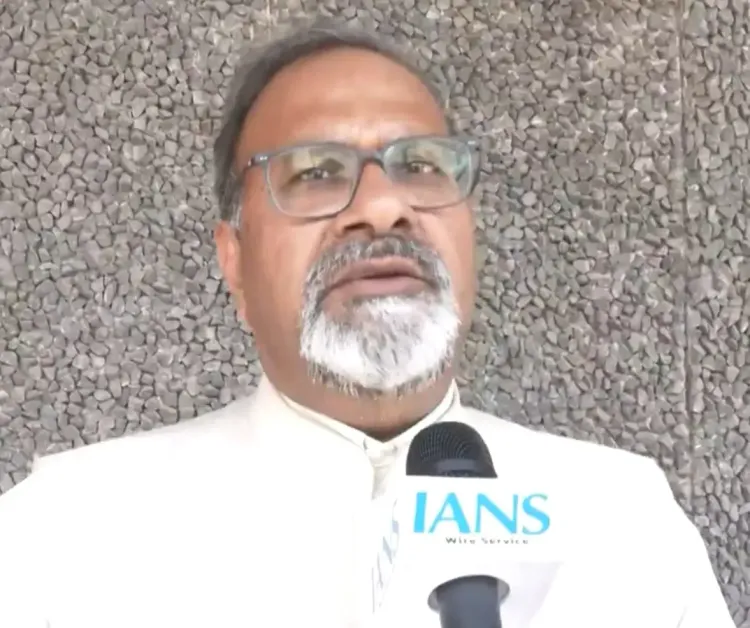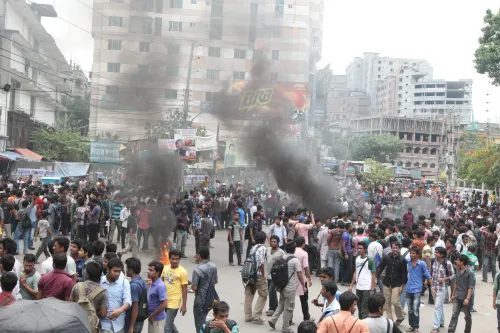Concerns Rise Over Islamist Forces in Bangladesh: Ex-Ambassador

Synopsis
Key Takeaways
- Islamist forces are attempting to gain control in Bangladesh.
- Instability in Bangladesh will impact India and its border states.
- Experts are seeking strategies for India to handle changes in Bangladesh.
- Minorities are facing persecution, with India being unfairly blamed.
- The Bangladeshi army may be the only stabilizing force.
New Delhi, March 26 (NationPress) The attempts by Islamist forces to assert dominance in Bangladesh are alarming, remarked India's former Ambassador Sushil Singhal, who also holds the position of Vice-President at Antar Rashtriya Sahyog Parishad (ARSP), during a statement on Wednesday. He emphasized that any unrest in Bangladesh will significantly affect India and its bordering regions.
While addressing attendees at a two-day conference in New Delhi focused on the 'Implications of Political Turmoil in Bangladesh', the former diplomat underscored the escalating instability in Bangladesh and the emergence of Islamist factions within its borders.
“Developments in Bangladesh are crucial for us in India, given that Bangladesh is entirely surrounded by our territory. Consequently, any unrest, challenges, or positive changes will have repercussions for our bordering states. Thus, it's critical for us to monitor the situation in Bangladesh closely,” stated Singhal.
Leading diplomats and analysts also deliberated over strategies for India and formulated a roadmap to navigate forthcoming changes in Bangladesh.
“Recently, the U.S. NIA chief commented on the circumstances in Bangladesh, prompting a notable backlash from the Bangladeshi side. Additionally, the ongoing attempts by Islamist factions to seize control in Bangladesh are troubling, as these actions diverge from the nation's cultural identity,” Singhal noted, drawing from his extensive experience in Indian missions in Bangladesh, Tanzania, Belgium, and Hungary.
He pointed out that Islamist groups are reintroducing radical elements defeated during the 1971 Bangladesh Liberation War, and these factions are increasingly gaining influence in the country, aided by Pakistan since the interim government led by Muhammad Yunus assumed power last August.
As Yunus arrived in China on Wednesday, experts speculated on the reasons behind India's lack of response to the Chief Advisor's request for a meeting with Prime Minister Narendra Modi prior to his departure for Beijing.
“Professor Muhammad Yunus has repeatedly expressed his wish to meet with our Prime Minister. They have made several requests to convene, seeking to demonstrate that everything is stable. However, for true stability, they must adhere to their own statements. What is evident is that the situation in Bangladesh does not align with their claims,” Singhal commented.
“Minority groups are facing persecution, India is being scapegoated, and Bangladeshi advisors are asserting that any unrest is a result of India’s actions. In this hostile environment, a meeting or visit would likely be unproductive and potentially harmful,” the ambassador added.
When asked about the recent emergency meeting of the Bangladeshi military and discussions regarding the potential imposition of President's rule, he remarked that the army currently stands as the only institution capable of maintaining unity in Bangladesh.
“The issue is that the Bangladesh Constitution does not accommodate provisions for President's Rule or an interim government. Therefore, from a legal standpoint, the legitimacy of the current administration is questionable. Furthermore, it's apparent that the Prime Minister of Bangladesh, Sheikh Hasina, has not resigned,” Singhal concluded.










